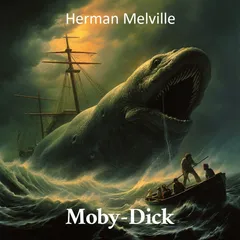Herman Melville
Herman Melville, the literary mariner navigating through the fathomless depths of the human condition, was a voice as profound and echoing as the ocean in his magnus opus, “Moby Dick”. He was a literary explorer, diving into the abyss of human despair, triumph, and tragic irony. His prose, resplendent with metaphor, allegory, and symbolism, was his trusted compass, guiding his readers through the thrilling yet treacherous seas of existence.
Born on August 1, 1819, in New York City, Melville was woven from the very fabric of America’s tumultuous tapestry. The death of his father left him grappling with financial instability, an experience that would come to shape the tragic undercurrents of his narratives. Like Ishmael, the protagonist of "Moby Dick", he charted a course towards the sea, seeking solace and survival in its vast expanse.
Melville was both a sailor and a scribe. His early experiences in the merchant marine and later in the whaling industry provided the ink for his narratives. The enigmatic world of seafaring, with its promise of adventure and peril, served as the backdrop for much of his work. His writing style, a singular mélange of profound, philosophical, and exultant tones, often interlaced with a thread of the tragic and darkly humorous narrative, reflected his own grappling with the metaphysical, spiritual, and existential.
Melville was a literary alchemist, transmuting the raw ore of his seafaring experiences into rich narratives laden with symbolism. His depictions of the natural world, whether it was the roiling sea or the seemingly endless sky, were as intricate and nuanced as his understanding of the human psyche. "Moby Dick", often regarded as his masterpiece, embodied this synergy of style and substance. The white whale, a haunting metaphor for human obsession, nature's indifference, and the inscrutability of God, became a testament to Melville’s mastery of allegory.
His narrative resonated with an undercurrent of tragedy, mirroring his own existential struggles. Yet, amidst this tragedy was an exultant appreciation for the human spirit's resilience and an exploration of the mystical, even in the most mundane aspects of life. Melville’s prose, as tumultuous as the seas he once sailed, was an exquisite dance of light and shadow. He plunged into the dark depths of human despair, only to resurface with pearls of wisdom that illuminated the spectrum of the human condition.
His writings, rife with questions about life, fate, and divine justice, did not offer solutions but rather invited contemplation. Despite Melville's profound contribution to American literature, his work was not fully appreciated during his lifetime. However, like the mythical phoenix, his literary stature was reborn posthumously, and he is now recognized as a pioneer of American literary modernism.
Melville’s explorations of existence, his pursuit of truth in the face of unyielding uncertainty, and his portrayal of the tragic grandeur of the human experience continue to echo in literary history. Herman Melville passed away on September 28, 1891, yet his legacy continues to chart the course for countless voyages into the depths of literary exploration. Like the omnipresent ocean in his narratives, Melville's influence remains, constant and immeasurable, a testament to the enduring power of storytelling that transcends time, space, and mortality.
Read more on Wikipedia

